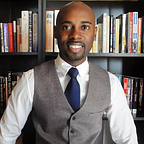What Are You Meant to Do in Life?
In my mid-twenties, I walked away from a traditional money-making career path in consulting to become an educator. Many of my closest friends cautioned me that my decision to become an educator would be signing up for a life of poverty. However, I was willing to do so if it meant improving the life outcomes of overlooked students.
Before leaving the consulting company, I spent months figuring out: “What am I meant to do in life?” I want to share my journey with you in hopes that if you’ve been asking yourself this same question lately, here how to get started:
What Were Your Childhood Values?
I remember being eight years old, standing up to my dad about a personal matter that I felt was unfair. And then as a nine-year-old, I was often made fun of for being too generous.
Looking back on those younger years, I now see that I was driven by fairness and empathy over achievement. In those early years, I seldom hesitated to confront a friend, a sibling, or a parent who put down or pushed others around.
I was embarrassed by things like being too skinny in high school, and yet, I was highly confident by things like standing up and speaking up for fair treatment. I felt drawn to individuals who demonstrated similar fearlessness in standing up for the overlooked, for the disfavored, and the “least of these.”
By college, it was clear that my childhood and teenage years revealed my inclination to serve others. I was curious about what form my life’s calling would take. Would I become a religious leader like the ones I had deeply admired growing up? Would I enter the classroom and serve as a bridge for the next generation to find their life’s purpose? Would I build a company that could employ hundreds of individuals so that they could create the life they envision for themselves? Or, would I seek political office to advocate for resources that uplift communities?
Your Inner Voice Is Speaking. Are You Listening?
As a less wealthy, first-generation college student, I felt that a college degree could help build wealth for myself, my immediate family, and my future family. After college graduation, I started my first career as a business analyst with a consulting company while still tutoring elementary students in math on Saturday morning. Six months into my consulting job, I could no longer resist the inner voice that let me know that I was not following my real heart’s desire. I went inward and did some soul searching, and, in that process, I had to clear away the voice of my college professor who told me: “No, don’t go into education. There are more opportunities in business. Plus, it’ll be easier to become an educator after being in business than it would be to go into business after being an educator.”
I had to clear the cultural messages that educators take a vow of poverty. Also, I didn’t have many black male teachers growing up. In fact, I’ve only had 1 black male educator throughout my entire schooling experience between kindergarten to my second Master’s degree. Finally, I had to confront the narrative that education is not “the kind of thing men do.” Culturally speaking, men are expected to pursue careers in finance, tech, or construction — not education.
Can You Accept the Reality that Following Your Calling Doesn’t Mean That Everything Will Be Perfect?
While I enjoyed my experience at the consulting company, I could no longer continue doing a job that didn’t light me up inside the way education had done. I allowed the overvaluing of others’ opinions as well as the anxiety of not choosing the “right” money-making career path to lead me to lose connection with the person I knew myself to be.
Once I had accepted that challenges would be par for the course while pursuing my life’s calling, I was able to go forward knowing that I have the ability to handle the “not so good parts” of pursuing an education career path without seeing immediate financial rewards. Leaving a secure job for education was frightening but also so very exciting. Since pursuing a career in the education field, I live a life filled with meaning despite having faced some challenging moments along the way. My friends were right about the amount of pay I’ve received from certain education jobs; however, in time, I’ve learned resourceful ways to live an affordable life until I can create multiple streams of income. I am hopeful that I will experience a life filled with both money and meaning in due time. In the meantime, I remain optimistic that the skills I’m building have equipped me to continue working towards my mission, preparing individuals to continue their education beyond high school in the hope that they, too, will pursue a career path that aligns with their life’s calling.
